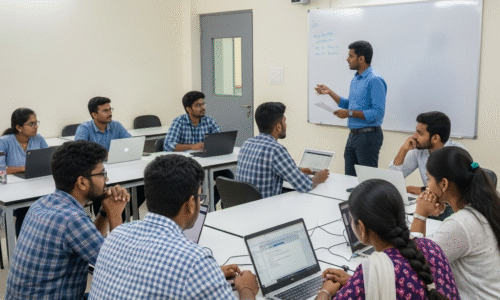Media Research Course (AC007)
Unlock the power of data and insights in the world of communication with our Media Research certificate course! This 6-month program is meticulously designed for individuals eager to understand, analyze, and interpret media phenomena, from audience behavior to content effectiveness. Develop critical skills to inform strategic decisions in media, marketing, and communication.
Course Highlights:
- Duration: 6 Months
- Learning Modes: Online | Offline
- Medium: Tamil / English
- Who Can Join: Media students, marketing professionals, content creators, communication specialists, aspiring researchers, and anyone interested in understanding media impact.
- Educational Qualification: A basic understanding of research concepts is beneficial, but not mandatory. Basic reading and writing skills are essential.
- Flexible Schedule: Choose the learning schedule that best fits your life: Early Mornings, Evenings, Weekends, or Holidays.
What You’ll Learn (A Complete Practical Package):
Our curriculum provides a practical, hands-on approach to conducting and utilizing media research, covering essential theoretical frameworks and analytical tools:
- Introduction to Media Research:
- Defining media research: its scope, purpose, and importance in various sectors (e.g., journalism, advertising, public relations, entertainment).
- Historical overview and evolution of media research.
- Understanding different paradigms in media studies.
- Types of Media Research:
- Audience Research: Studying media consumption habits, demographics, psychographics, and preferences.
- Content Research: Analyzing media messages, themes, frames, and representations.
- Effects Research: Investigating the impact of media on individuals and society (e.g., cultivation theory, agenda-setting, priming).
- Industry Research: Examining media economics, trends, and organizational structures.
- Research Methodologies & Design:
- Quantitative Research: Principles of surveys, experimental designs, and statistical analysis.
- Qualitative Research: Principles of in-depth interviews, focus groups, ethnographic studies, and case studies.
- Mixed Methods Research: Combining quantitative and qualitative approaches for comprehensive insights.
- Formulating research questions and hypotheses relevant to media studies.
- Data Collection Techniques Specific to Media:
- Surveys & Questionnaires: Designing effective surveys for media audiences.
- Content Analysis: Systematic methods for analyzing media content (e.g., news articles, advertisements, social media posts).
- Focus Groups: Facilitating discussions to gather qualitative insights on media perceptions.
- Interviews: Conducting structured, semi-structured, and unstructured interviews with media professionals and consumers.
- Observational Studies: Techniques for observing media consumption behaviors.
- Introduction to digital analytics tools for online media (e.g., website analytics, social media listening).
- Basic Data Analysis & Interpretation:
- Introduction to descriptive statistics for quantitative data (e.g., frequencies, percentages, means).
- Basic thematic analysis for qualitative data.
- Interpreting findings and drawing meaningful conclusions from media research data.
- Ethical Considerations in Media Research:
- Ensuring informed consent, privacy, and confidentiality.
- Addressing potential biases and ensuring objectivity.
- Responsible reporting of research findings.
- Presenting Research Findings:
- Structuring research reports and academic papers.
- Creating effective data visualizations and presentations.
- Communicating complex research findings clearly and concisely to diverse audiences.
Evaluation:
Your progress will be assessed through practical assignments, including designing a mini-media research project, conducting a small-scale content analysis or audience survey, and a final presentation of your research findings.
Learning Outcome:
Upon completion, you will possess a foundational understanding of media research principles, practical skills in designing and executing basic media studies, analyzing data, and presenting actionable insights. You will be well-prepared to contribute to research efforts in media organizations, academic institutions, or leverage data-driven approaches in your communication strategies.
Scholarships & Benefits
At Anali, we believe in supporting talent. Eligible candidates who meet our criteria will receive full scholarships and access to other beneficial offers from our service schemes.
Ready to Begin Your Journey as an Effective Media Researcher?
To start the admission process, please fill out the following form:
Instructor


